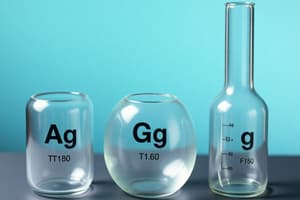Podcast
Questions and Answers
What is the primary focus of thermodynamics?
What is the primary focus of thermodynamics?
- Electromagnetic phenomena
- Energy transfers and system behaviors (correct)
- Quantum mechanics principles
- Atomic structure and interactions
According to the first law of thermodynamics, what happens to energy within a system?
According to the first law of thermodynamics, what happens to energy within a system?
- It disappears after a certain time
- It can increase infinitely
- It can neither be created nor destroyed (correct)
- It can be converted only to heat energy
Which law of thermodynamics describes the tendency of system entropy to increase over time?
Which law of thermodynamics describes the tendency of system entropy to increase over time?
- Second law (correct)
- Fourth law
- Zeroth law
- Third law
What does the third law of thermodynamics suggest happens as temperature approaches absolute zero?
What does the third law of thermodynamics suggest happens as temperature approaches absolute zero?
Which thermodynamic principle leads to prominent theories like the Kelvin statement of the second law?
Which thermodynamic principle leads to prominent theories like the Kelvin statement of the second law?
What key attribute does the ideal gas model offer when studying thermodynamic concepts?
What key attribute does the ideal gas model offer when studying thermodynamic concepts?
What does the ideal gas model assume about the behavior of gas particles?
What does the ideal gas model assume about the behavior of gas particles?
Which equation accurately describes the behavior of real gases by considering intermolecular forces?
Which equation accurately describes the behavior of real gases by considering intermolecular forces?
How are thermodynamic systems classified based on their interaction with surroundings?
How are thermodynamic systems classified based on their interaction with surroundings?
Which energy transfer mechanisms are crucial in thermodynamic systems?
Which energy transfer mechanisms are crucial in thermodynamic systems?
What technological advancements have emerged from thermodynamic research?
What technological advancements have emerged from thermodynamic research?
Why is understanding the core precepts of thermodynamics important for scientific disciplines and technological advancements?
Why is understanding the core precepts of thermodynamics important for scientific disciplines and technological advancements?
Study Notes
Exploring Thermodynamics in Physics
At the crossroad of energy transfers and system behaviors lies thermodynamics, one of the cornerstones in modern physics education. As a foundational discipline, it provides insights into everything from the efficiency of heat engines to the structure of galaxies. Let's delve deeper into various perspectives associated with thermodynamics.
Laws of Thermodynamics
Thermodynamics rests upon four primary laws:
- Zeroth law of thermodynamics—two systems in thermal equilibrium with a third system must themselves be in equilibrium.
- First law of thermodynamics—energy can neither be created nor destroyed; it converts from one form to another, and obeys conservation principles.
- Second law of thermodynamics—system entropy (orderliness) increases over time unless external forces act.
- Third law of thermodynamics—as temperature approaches absolute zero (-273.15°C), the entropy of a perfect crystal tends toward a minimum value.
These laws relate to both reversible and irreversible processes, helping us analyze complex systems around us. They also lead to prominent theories like the Kelvin statement of the second law (which promotes refrigerators) and Gibbs free energy change (used in chemical reactions).
Ideal Gas Model
The ideal gas model offers simplification and clarity when studying thermodynamic concepts. Using kinetic molecular theory assumptions—such as particles behaving independently with no intermolecular forces—this model helps quantify relationships among pressure, volume, temperature, and the number of moles. For instance, the equation ( PV = nRT ) demonstrates how these variables are related within the context of the ideal gas model.
Real Gas Behavior
Real gases deviate slightly from the ideal gas model owing to intermolecular forces. Van der Waals equation, originally developed by Dutch chemist Johannes Diderik van der Waals in 1873, accounts for these effects.
[ (P + \frac{n^2R^2T}{V^2})(V - nb) = nRT ]
This equation accurately describes compressibility, critical points, and liquid–vapor coexistence in real gases.
Thermodynamic Systems
Understanding thermodynamic systems requires classification according to whether they interact with surroundings (open vs closed) and exchange mass (homogeneous vs heterogeneous). Energy transfer mechanisms like conduction, convection, and radiation play crucial roles depending on the circumstances.
Applied Thermodynamics
Innovative applications stemming from thermodynamic research enrich our lives daily. Refrigeration, air conditioning, steam power plants, jet propulsion—all owe their existence and development to the study of thermodynamics. Additionally, novel processes—like solar cells and nanotechnological advances—have emerged from recent studies, pushing boundaries once thought impossible.
As you traverse through the fascinating world of thermodynamics, remember that understanding its core precepts will lay the groundwork for comprehending advanced scientific disciplines and technological advancements yet to come.
Studying That Suits You
Use AI to generate personalized quizzes and flashcards to suit your learning preferences.
Description
Delve deep into the fundamental laws, models, and applications of thermodynamics in physics. Learn about key concepts such as the laws of thermodynamics, ideal gas model, real gas behavior, thermodynamic systems, and applied thermodynamics.




